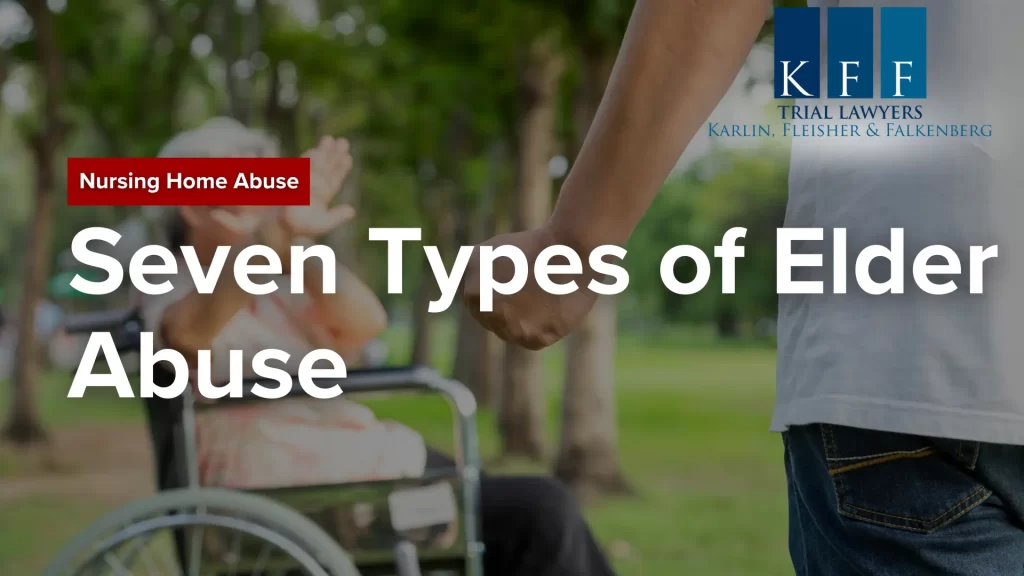
Senior citizens have worked hard and accomplished much throughout their lives, and as one of Chicagoland’s most vulnerable populations, they deserve our utmost respect and protection. However, elder abuse is still prominent in our state and across the country. Even the most seemingly well-meaning caregivers or relatives can be the perpetrators. What are the 7 types of elder abuse?
In 2023 alone, the Illinois Department of Aging’s Adult Protective Services division received 20,759 reports of exploitation, neglect, and abuse of elderly or disabled individuals. Just under half of the reports were ultimately ruled substantiated.
Keep reading to learn more about the seven different forms elder abuse can take. By understanding the signs of abuse in nursing home residents, you will be better prepared to advocate for your loved ones. What is a sign of elder neglect? What other forms of abuse exist?
1. Financial Abuse
Financial exploitation is the most common type of elder abuse Illinois investigates, representing under 25% of cases in one recent year. It happens whenever an abuser misuses an elder’s money or makes financial decisions for the elder without proper permission or authority.
Some common ways that financial abuse happens are:
- Misusing the elder’s checks, credit cards, or bank accounts
- Stealing the elder’s cash or assets
- Coercing the elder into signing wills, deeds, titles, contracts, or other legal documents
- Forging an elder’s signature
If you discover unusual and unexplained withdrawals or credit card charges, or if your loved one’s financial health suddenly changes, it could be a sign of ongoing abuse.
2. Emotional Abuse
The second most prevalent form of elder abuse by others in Illinois is emotional abuse, which resulted in about 17% of investigations. Emotional abuse involves inflicting psychological pain or distress through threats, intimidation, open humiliation and insults, or withholding access to family, friends, activities, and basic needs.
Emotional abuse commonly occurs alongside other forms. However, you should still watch closely for any of the following signs:
- Withdrawal from activities, especially those involving a specific person
- Rocking, mumbling, or other unexplained “self-soothing” behaviors
- Loss of self-esteem or confidence
- Unexplained depression or anxiety
3. Neglect
Neglect occurs when a caregiver or family member fails to properly care for the elder, whether negligently or deliberately. It can include the withholding of food, shelter, water, clothes, medical care, drugs, everyday mobility, and personal hygiene.
Signs of neglect can be physical or behavioral. Some examples of neglect in nursing homes include:
- Malnutrition or dehydration
- Pressure ulcers (bedsores)
- Poor hygiene
- Withdrawal from activities
- Reported lack of assistance
4. Physical Abuse
Physical abuse was the cause of about 10% of Illinois APS reports in 2023. This type of abuse occurs whenever someone uses force against an elder to deliberately cause pain, injury, or impairment. Hitting, slapping, pinching, beating, and the improper use of restraints all constitute physical abuse.
Some signs of physical elder abuse include the following:
- Unexplained bruises, cuts, or other injuries
- Frequent unexplained doctor or ER visits
- Sudden withdrawal from normal activities
- Fear of physical touch, especially from specific individuals
5. Sexual Abuse
Sexual elder abuse involves any non-consensual sexual contact with an elderly individual. It includes unwanted touching, harassment, sexual assault and battery, and rape. It also covers situations where an individual cannot affirmatively consent due to a disability, illness, or incapacitation.
Watch closely for any of the following signs:
- Injuries to genitals
- Unexplained diagnosis of a sexually transmitted disease (STD)
- Stained or torn undergarments
- Emotional distress, which can sometimes be sudden
- Fear of physical touch, especially from specific individuals
6. Abandonment
Abandonment is one of the cruelest forms of elder abuse, and it happens when a caregiver responsible for an elder’s basic needs instead chooses to desert them.
It can take various forms, including:
- Leaving the elder alone in a public place
- Admitting the elder to a nursing home and never returning
- Abandoning the elder at home with no assistance at all
In all cases, abandoned elders will be helpless and confused, and they might face medical emergencies – when they need help the most – without access to aid.
Family members should be vigilant for signs of abandonment, including:
- The elder wandering around the outside of their home unsupervised
- Lack of food, medications, or water
- Reports from the elder about being left alone
- Confusion about why caregivers have suddenly disappeared
- A general decline in physical health
- Unkempt appearance
- Malnourishment and dehydration
7. Self-Neglect
Self-neglect is a form of elder abuse, but not by another person. Instead, it occurs when an elder fails to meet their own essential needs. They might not be willing or able to eat, drink, put on clothing, maintain personal hygiene, or take the proper medications at the right time. The causes of self-neglect are diverse, ranging from physical and mental disabilities to simple feelings of hopelessness, depression, and disconnection.
Signs of self-neglect include the following:
- Sudden weight loss
- Worsening or untreated medical issues
- Unsanitary living conditions
- Unpaid bills
When self-neglect becomes severe, compassionate intervention and connecting the elderly to the right services may be necessary to get them back on track. To prevent self-neglect, ensure your loved one has a caring network of friends, relatives, and other caregivers who can provide a listening ear and help with their essential needs.
What If You Suspect Elder Abuse?
 Elder abuse often happens quietly and behind closed doors. If you notice any sign of abuse, take decisive action and investigate it further. Have a compassionate, open, and non-judgmental conversation with the elder about their situation, and see if they share any maltreatment experiences with you. You should also discreetly look into the elder’s financial statements, living situation, and care team. Thoroughly document any irregularities or concerns.
Elder abuse often happens quietly and behind closed doors. If you notice any sign of abuse, take decisive action and investigate it further. Have a compassionate, open, and non-judgmental conversation with the elder about their situation, and see if they share any maltreatment experiences with you. You should also discreetly look into the elder’s financial statements, living situation, and care team. Thoroughly document any irregularities or concerns.
Some of the ways an elder law firm in Illinois can help include:
- Gathering and preserving evidence
- Preparing and filing APS reports
- Representing the elderly during APS investigations and interventions
- Directing the elderly and their caregivers to other appropriate organizations and services
Litigation is not always the right option, but an attorney may prepare a lawsuit on the elder’s behalf if they determine it would be the best path forward.
Consult a Chicago Elder Abuse Attorney
When care facilities and caregivers cause harm, there are often lasting repercussions for both the elder and their loved ones. If you suspect abuse and see the warning signs in assisted living facilities, the Chicago nursing home abuse attorneys of Karlin, Fleisher & Falkenberg, LLC are ready to answer your call. Since 1970, we’ve recovered over $400 million for clients throughout the state, including survivors of nursing home neglect and abuse. Let our team apply our vast resources and extensive experiences to thoroughly investigate what happened and fight for justice. Contact our downtown Chicago office today at 312-346-8620 or reach us online for a free and confidential consultation.
